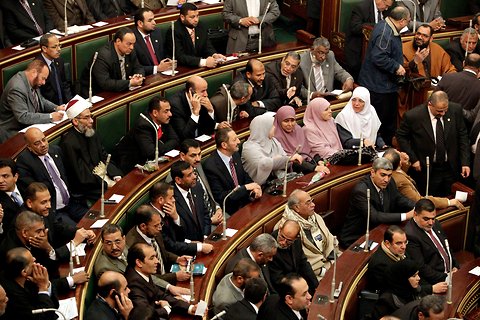UPDATES
One year on: how much has changed in Egypt?
January 25, 2012 | Daniel Meyerowitz-Katz

The New York Times‘ Lede blog is commemorating the one year anniversary of the beginning of the Egyptian revolution through a post containing reflections by an Egyptian activist, interspersed with footage he took from the protests in Cairo on 25 January last year. The piece is quite moving and manages to recapture the sense of optimism and determination that was being felt at the time:
Although the battles would continue later that evening and over the following days, we all knew that something profound had just happened. There was a raised collective consciousness amongst us. A realization. An epiphany. Simply, we will no longer be afraid. We drew strength, courage and resolve from one another, from our numbers, and from our conviction. Our small group right there reached that conclusion, as other Egyptians had reached it across the country that day. And in that moment, the Mubarak regime had lost its most significant weapon: fear. Eighteen days later, the tyrant stepped down.
How different to the feeling now? Today the ruling military regime, effectively Mubarak’s old regime sans figurehead, have handed legislative power to the recently elected Islamist coalition, although it is still not clear how much actual power (if any) will be afforded to the new parliament.
“Field Marshal Hussein Tantawi, the head of the Supreme Council of the Armed Forces, has announced in a letter to the people’s assembly the transfer of legislative power to the assembly,” the cabinet said on Facebook.
… Live TV footage brought the Islamist victory and gender disparity to life: wide shots showed the parliamentary chamber filled with bearded politicians, and hardly a woman in sight. The exact role of parliament remains unclear, with much power remaining in the hands of the generals who took over from Mubarak.
In fact, a report just released by Amnesty International shows that the majority of new parties in the Egyptian parliament have refused to support a full human rights declaration.
The eighth pledge, to end discrimination, was agreed to by most parties but several said they could not sign up to an end to discrimination on the basis of sexual orientation and gender identity. At least two parties said the issue of discrimination against Coptic Christians, including limitations against building churches, has been exaggerated.
A number of parties expressed reservations over the pledge to uphold women’s rights, which included granting equal rights in marriage, divorce, child custody and inheritance. Several parties invoked Islamic law to explain why they could not agree to the provisions.
Most parties made reservations over the final point calling for the abolition of the death penalty, either stating that it was in contradiction to Islam or that they were continuing to study the issue.
Finally, 26-year-old Egyptian blogger Maikel Nabil was just released from prison, having been held for 10 months on the spurious charges of “insulting the military” and “spreading false information”. Nabil is particularly controversial in Egypt because he dared to call for normalisation with Israel.
In late 2010 Nabil wrote in his blog that he would refuse to serve out his compulsory military service if doing so meant he would have to point a gun at Israeli soldiers carrying out their own mandatory service.
In February he posted a video clip pleading with Israelis to support the movement to oust Mubarak. “I’m calling for solidarity from my Israeli friends with the Egyptian revolution. I believe that democracy and human rights and women’s rights are basic Israeli values,” he said.
Nabil’s sentiments made him extremely unpopular in Egypt and allowed the military to silence him without too much objection. Given that the soon to be ruling Muslim Brotherhood is consistently rejecting the peace treaty with Israel and that opposing military action against Israel is still so controversial in Egypt, the future is looking rather bleak. While the fall of Mubarak may have facilitated relatively free elections (although allegations of irregularities are growing), there are few signs of the genuine democracy that so many were hoping for a year ago.
Daniel Meyerowitz-Katz
Tags: Egypt





